|
|
|
|
Index to our previous shows
June 29, 2004 - Greg Bear
June 6, 2004 - Gene Meyers
Shows from May, 2004
Shows from April, 2004
Shows from March, 2004
Shows from February, 2004
Shows from January, 2004
Shows from December, 2003
Shows from November, 2003
Shows from October, 2003
Shows from September, 2003
Shows from August, 2003
Shows from July, 2003
Shows from June, 2003
Shows from May, 2003
Shows from February, 2003
Shows from January, 2003
Shows from December, 2002
Shows from November, 2002
Shows from October, 2002
Shows from September, 2002
Shows from August, 2002
Shows from July, 2002
Shows from June, 2002
Shows from May, 2002
Shows from April, 2002
Shows from March, 2002
Shows from February, 2002
Shows from January, 2002
Shows from December 2001
Shows from November, 2001
Shows from October, 2001
Shows from September, 2001
Shows from August, 2001
Shows from July, 2001
Shows from June, 2001
Shows from May, 2001
Shows from April, 2001
Shows from March, 2001
Shows from February, 2001
Shows from January, 2001
Shows from November - December, 2000
Shows from September - October, 2000
Shows from July - August, 2000
On Tuesday - June 29th, 2004 - our guest was author Greg Bear, chatting with us about his newest book Dead Lines and various other subjects.
In fact tonight's show will feature two interviews with Greg. The first was recorded at the WorldCon in San Jose and the second was recorded a couple of weeks ago when he passed through LA on the book tour for Dead Lines.
Greg Bear is an author who is - at least in my mind - best known for his wonderfully crafted speculations based on hard science. But sometimes he takes those stories right up to the nightmare border of horror.
If you doubt this, then go and read Blood Music. That story is good 'hard SF', but it is also one of the most frightening stories that I have ever read. And it remains one of my very favorite stories. {Just be careful about reading it late at night with the lights turned down low.}
In his newest book, Dead Lines, Greg manages to do it again. In this novel he tells the story of what happens when a new technology opens a pathway between the world of the living and the dead. {Greg has managed to write a hard SF ghost story!} The results are everything you'd expect from a book by Greg Bear: well thought out speculations about the implications of the story's central idea, interesting characters, a well developed plot and a serious dose of entertainment. Along with more than a few shudders.
This book was way cool. I think you'll like it.
|
|

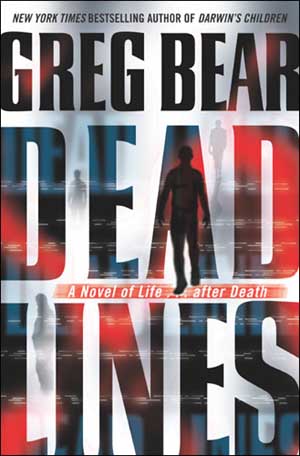
|
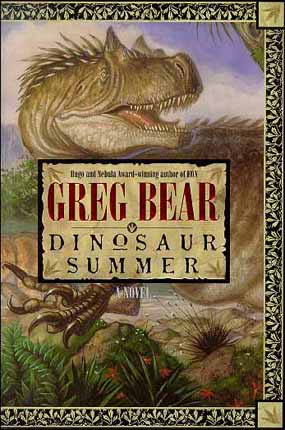
|
|
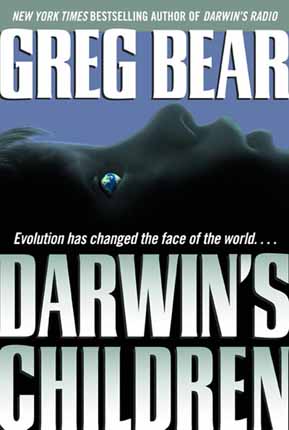
|
Godzilla Uncut
I'm sure that most of you know that the version of Godzilla that has been seen in the United States is significantly different from the original version shown in Japan. Many scenes were deleted and sub-plots were changed, softened or even removed. Scenes featuring the character of Steve Martin, played by Raymond Burr, were added to make the movie more appealing to Western audiences.
And despite those changes Godzilla remains a surprisingly good film.
But with those changes excised and the film restored to its original form it becomes an example of the power of science fiction to tell stories that are too uncomfortable or distressing to tell using a conventional medium.
For Godzilla is an allegory about atomic war and technology run amok.
|
|

|
Its scenes of the destruction of Tokyo suggest the devastation of Hiroshima and Nagasaki, while allowing us the comfortable buffer of fiction. The moral dilemma of the scientist who knows that to defend his homeland requires that he unleash an even more destructive force, echoes the choices faced by the scientists who developed the atomic bomb.
Godzilla was, and remains, a work of entertaining fiction. However its lasting appeal is that it does more than just entertain. It shows us what it is like to be the victim of an uncontrollable force. But more than that, it shows us that without the the leavening of conscience and responsibility, we will become the very force we have been taught to fear.
And now - for a short time - you can see this film as it was meant to be seen.
The deleted scenes have been put back in, the extra scenes removed and the bad dubbing replaced by sub-titles.
In honor of the 50th anniversary of the film's release the good folks at Rialto Pictures have made arrangements to get a fresh print of the original version of Godzilla and are showing it in selected theaters across the United States.
Now this isn't some mass release where the film is showing in thousands of theaters at the same time. Instead the film is slowly moving its way across the country, showing in a single theater in each U.S. city as it tours.
The schedule for the tour can be found at the Rialto Pictures Web Site.
If you have never seen this film in its original form, then you are in for a treat of first magnitude. If you are lucky enough to have seen this version before, then you know why you'll want to go back and see it again.
Most highly recommended!
Dateline: Mars
NASA is releasing all of the images from the two Mars Exploration Rovers almost as soon as they arrive at JPL. The raw images for the Spirit rover can be found at this Web Page and raw images for Opportunity can be found here. The images that have been released to the press, along with animations and explanatory text, can be found here. You can find larger versions of the images shown below at that last NASA Web Site.
Opportunity
|
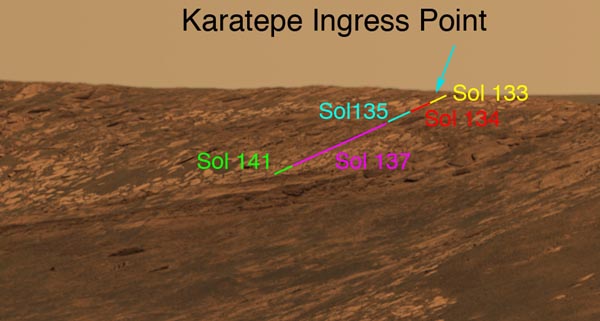 Image Credit: NASA/JPL
Image Credit: NASA/JPL
|
The picture above shows the route that Opportunity will be taking as it descends into Endurance Crater.
|
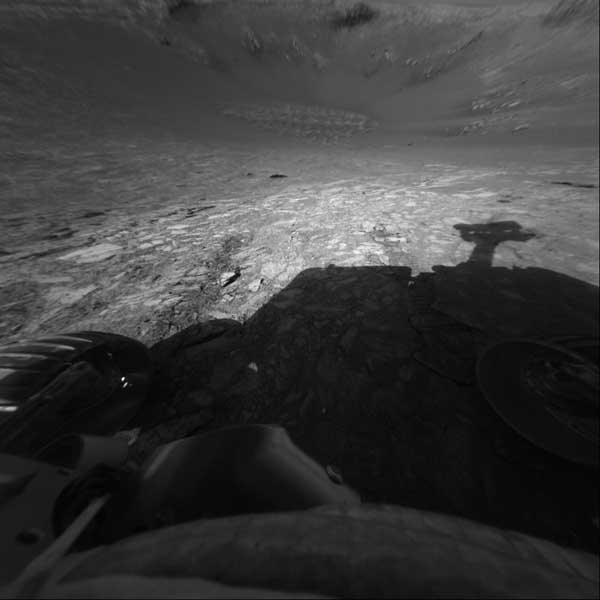 Images Credit: NASA/JPL
Images Credit: NASA/JPL
|
Here is a picture looking down into Endurance Crater as Opportunity makes its descent.
|
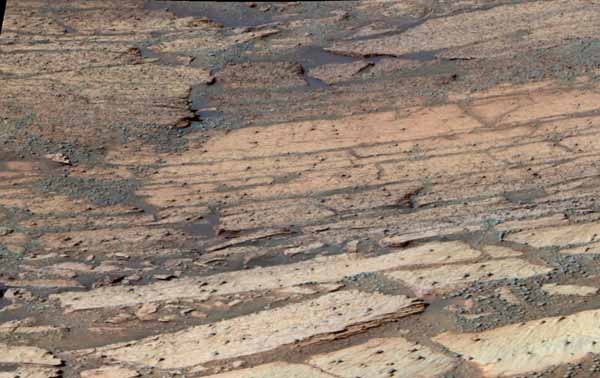
Image Credit: NASA/JPL
|
This is a false color image of the layered rocks that Opportunity is investigating. Studies of the structure and composition of these rock layers promise to offer significant insights into the geologic history of Mars.
|
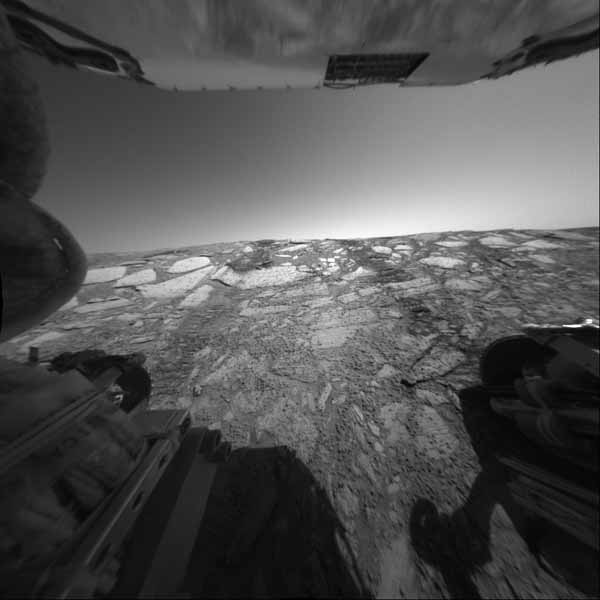
Image Credit: NASA/JPL
|
And here we are looking up from inside Endurance Crater.
|
|
Spirit
|

|
The Columbia Hills in color.
|
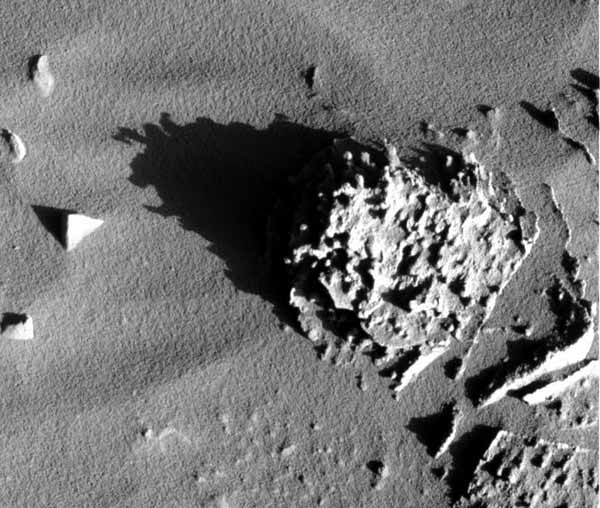
Image Credit: NASA/JPL
|
This picture shows a rock that the NASA scientists have named "Pot of Gold". The low Sun angle in this picture causes it to cast elongated shadows that accentuate its spiky appearance. This rock looks unlike any other rocks that the scientists have seen on Mars.
|
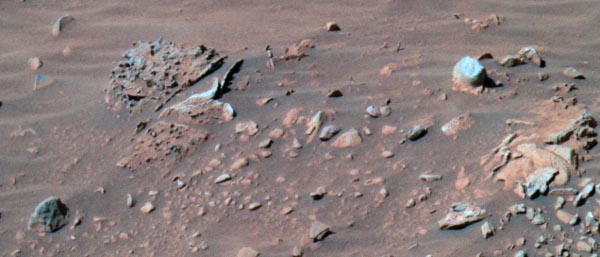
Image Credit: NASA/JPL
|
This false color image shows 'Pot of Gold' and the surrounding rocks. Analysis of images like this, along with other data, shows that this rock is rich in hematite, which suggests that abundant water once covered this part of Mars.
|
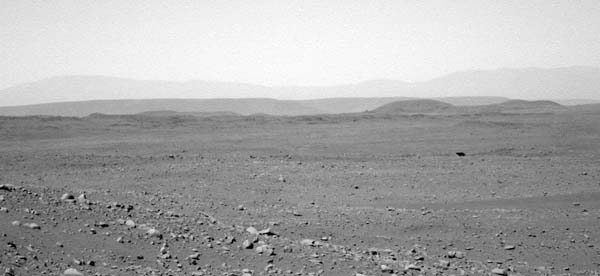
Image Credit: NASA/JPL
|
And stretching off into the distance are even more hills awaiting our exploration.
|
Listen to this show
|
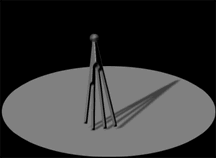
|
- Click here to listen to the entire show. {1:20:19}
Or
- Click here for the show's intro music.{0:41}
- Click here for the show's opening. {23:49}
- Click here for our first interview with Greg Bear. {18:56}
- Click here for the transition between the interviews. {0:26}
- Click here for our second interview with Greg Bear. {34:44}
- Click here for the show's closing.{1:43}
- Click here for links to all of our previous Shows that you can listen to on the Hour 25 Web Site.
|
If you enjoyed this show and would like to know when other interviews are uploaded to the Hour 25 web site, then send an email to me at [email protected] and I will add your name to the free Hour 25 Newsletter mailing list. That way you'll get a brief notice in your email every time a new show gets uploaded to the web.
Links for more information relating to this week's show
Greg Bear
Be sure to vist Greg's official Web Site to find out more about his books and his future plans.
You can learn more about the Science Fiction Museum that Greg discussed by going to their Web Site.
You can read another interview with Greg here or here.
Burt Rutan and the X-Prize
Burt Rutan, and his company Scaled Composites, has been making great progress in their attempt to develop a vehicle that can carry three people on a suborbital journey into space and win the X-Prize. Be sure to check out their Web Site to find the latest results from their flight test program. You can also find information there concerning their upcoming X-Prize flight.
Information about the X-Prize can be found at their Web Site.
Additional information about the prospects for suborbital space travel can be found at the Web Site for the Suborbital Institute.
The Cassini Mission to Saturn
Much information about the Cassini mission can be found at the Project's Official Web Site at JPL.
JPL is constantly releasing pictures from Cassini. You can find them by going to this JPL Web Page.
Additional information about the Cassini mission can be found at this ESA
Web Site.
Space Related Organizations
If you are interested in learning more about current space activities there are many local and national organizations you might want to know about. Joining these organizations and taking part in their activities is a good way to stay abreast of things going on in space as well as a way to show your support for those activities. Listed below are some of those organizations.
The Organization for the Advancement of Space Industrialization and Settlement has long been place for persons living in the Los Angeles area to gather and discuss the promise of space. Be sure to check out their Web Site for information about their meetings and other activities.
The Orange County Space Society is another Los Angeles area organization that provides a focal point for persons who are interested in space developments to get together and share their ideas. They have created a number of displays explaining the history and importance of space exploration that have appeared at various public events. Be sure to check their Web Site for information about their meetings and other events.
The National Space Society has a long history of being an advocate for a vigorous space program and provides much information to its members through their magazine and Web Site.
The Space Frontier Foundation is a strong advocate for a non-governmental space program and serves as a focal point for much activity in that arena. Their annual conference in Los Angeles during the Fall is a great way to find out what is happening in the non-government space arena.
The Space Access Society is focused on reducing the cost of going into space by promoting non-governmental launch vehicle programs. Their annual conference in the spring is a major source of information on non-traditional launch vehicle activities.
The Planetary Society is focused on the exploration and has a wealth of information for its members and others.
Space News - Mars
For more information about the Mars Exploration Rovers be sure to check out the MER Web Site at JPL or this Mars Rover site at Cornell University.
To learn more about the Mars Express mission you can go to this ESA Mars Express Web Site, this Mars Express Web Page from JPL, this NSSDC Mars Express Web Page, or this Web Page from Mars News.Com.
For more information about the Exploration of Mars be sure to go to the JPL Mars Exploration Site, the Center for Mars Exploration at NASA Ames, or the Mars Missions Web Site at the Planetary Society.
Information about the data returned by previous Mars missions can be found at this Mars Web Page at the NSSDC.
Information about the Phoenix Mission to Mars can be found at this Press Release from the University of Arizona. You can view a 3D picture of the Mars Phoenix spacecraft here.
For more Mars news be sure to check out the Mars News.Com Web Site.
Percival Lowell did much to shape our ideas about Mars in the early years of the 20th Century. You can learn more about his work by reading this on-line copy of his 1895 book Mars.
For On-Going Updates on Space News
Links relating to the loss of Space Shuttle Columbia can be found here.
The Reusable Launch & Space Vehicle News Web Site Web Page that is part of the Hobby Space Web Site is a really good place to watch for news about, well... Reusable Launch Vehicles and related subjects. I check it out just about every day and often find news there that doesn't show up anywhere else. Give it a look. {And while you're there be sure to check out some of the site's other pages. Wow! Is there a lot of information there.}
The Space Today Web Site is a great place to find space news from all over the 'net.
The Spaceflight Now Web Site carries real time information about current space missions and presents a lot of space and astronomy news. This is the place I go to when I want up to the minute information about current space missions. Do I need to say more?
The NASA Watch Web Site is another great place for getting information about current space missions. Check there also for news about other 'goings on' within NASA. Highly recommended.
ISS News
The Florida Today Web Site has a very interesting report about the causes of the ISS budget problems and their impact on the space program. It makes very interesting reading.
Click here to view the press kits for various ISS missions.
Check out the NASA International Space Station Web Page or the Boeing Web Page to learn more about this project.
A great source of news about Russian space activities, including their work on the ISS, can be found at the Russian Space Web.
Do you wonder where the Space Station is right now? You can use your browser to view real time maps showing the location of the ISS by going to this link at the NASA Space Link Web Site or here at the Johnson Spacecraft Center. Please note that your browser must support Java to make use of this satellite tracking software.
You can find out when the ISS - or many other spacecraft - can be seen from your location by going to this NASA Web Page. Please note; your browser must support Java for this application to work.
Click here for information about the audio files used for Hour 25 and for information about configuring your browser and downloading audio players.
Please note Web Pages from external sites will open in a separate browser window and that Hour 25 Productions are not responsible for the content of any external Web Sites.
|
Return to the Index for this month's shows
On Sunday - June 6th, 2004 - our guest was engineer Gene Meyers, chatting with us about ways that Space Shuttle External Tanks could be used to reinvigorate our space program.
The Space Shuttle uses an External Tank that is the size of a multi-story office building to hold the propellants needed to send the Orbiter into space. After the propellants are drained from this tank it is discarded and allowed to crash back onto the Earth.
Gene Meyers believes that there are better things to do with those ETs than using them to clutter the bottom of the Pacific Ocean. He wants to use them to build large space stations that could form the core of an expanded space program.
|
|

|

|
A space station could be built from a single External Tank...
|
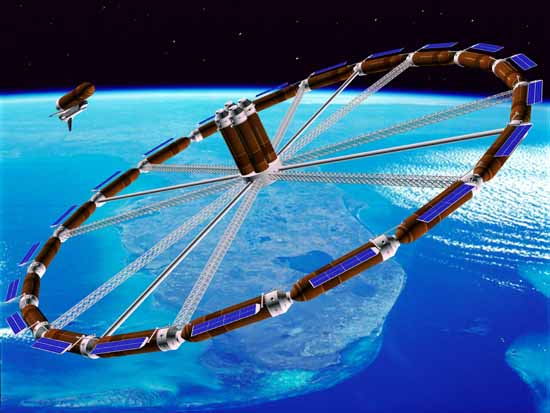
|
Or multiple External Tanks could be used to build a rotating toroidal station similar to the ones envisioned by Von Braun and others.
|
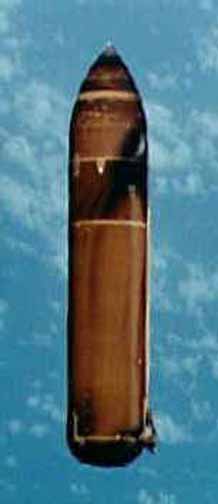
|
|
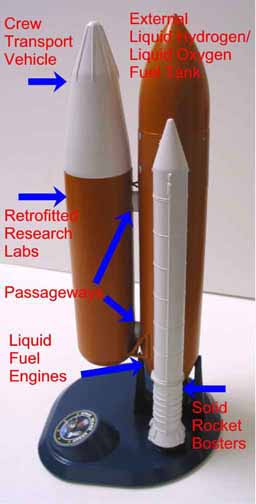
|
On the left, a Shuttle External Tank drifts in space. It could have become a space station, instead it will soon become discarded wreckage on the bottom of the ocean.
Components from the Shuttle could be used to assemble a crew/cargo vehicle, like the one shown on the right, that would deliver significantly more payload to orbit than the current Shuttle.
|
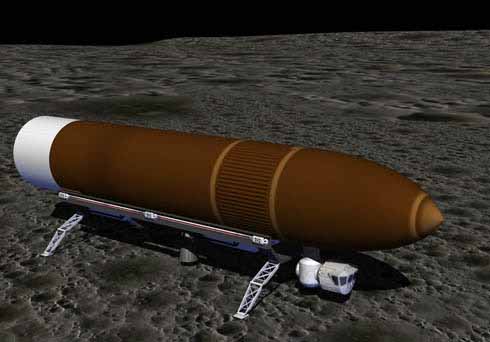
|
And who knows? Perhaps External Tanks could some day find themselves going all the way to the Moon.
Gene and I talk about these and other ideas in this week's show. I think you'll agree with me that Gene is an eloquent proponent of the idea that Shuttle External Tanks are far too valuable as building blocks for space development to be just thrown away on a regular basis. And I agree with him most strongly.
|
Godzilla Uncut
I'm sure that most of you know that the version of Godzilla that has been seen in the United States is significantly different from the original version shown in Japan. Many scenes were deleted and sub-plots were changed, softened or even removed. Scenes featuring the character of Steve Martin, played by Raymond Burr, were added to make the movie more appealing to Western audiences.
And despite those changes Godzilla remains a surprisingly good film.
But with those changes excised and the film restored to its original form it becomes an example of the power of science fiction to tell stories that are too uncomfortable or distressing to tell using a conventional medium.
For Godzilla is an allegory about atomic war and technology run amok.
|
|

|
Its scenes of the destruction of Tokyo suggest the devastation of Hiroshima and Nagasaki, while allowing us the comfortable buffer of fiction. The moral dilemma of the scientist who knows that to defend his homeland requires that he unleash an even more destructive force, echoes the choices faced by the scientists who developed the atomic bomb.
Godzilla was, and remains, a work of entertaining fiction. However its lasting appeal is that it does more than just entertain. It shows us what it is like to be the victim of an uncontrollable force. But more than that, it shows us that without the the leavening of conscience and responsibility, we will become the very force we have been taught to fear.
And now - for a short time - you can see this film as it was meant to be seen.
The deleted scenes have been put back in, the extra scenes removed and the bad dubbing replaced by sub-titles.
In honor of the 50th anniversary of the film's release the good folks at Rialto Pictures have made arrangements to get a fresh print of the original version of Godzilla and are showing it in selected theaters across the United States.
Now this isn't some mass release where the film is showing in thousands of theaters at the same time. Instead the film is slowly moving its way across the country, showing in a single theater in each U.S. city as it tours.
The schedule for the tour can be found at the Rialto Pictures Web Site.
If you have never seen this film in its original form, then you are in for a treat of first magnitude. If you are lucky enough to have seen this version before, then you know why you'll want to go back and see it again.
Most highly recommended!
Dateline: Mars
NASA is releasing all of the images from the two Mars Exploration Rovers almost as soon as they arrive at JPL. The raw images for the Spirit rover can be found at this Web Page and raw images for Opportunity can be found here. The images that have been released to the press, along with animations and explanatory text, can be found here. You can find larger versions of the images shown below at that last NASA Web Site.
Opportunity
|
 Image Credit: NASA/JPL
Image Credit: NASA/JPL
|
Shown above is panorama of Endurance Crater taken from the opposite side of the crater from the one used to obtain the images that were shown on our previous shows. The curvature of the horizon is an artifact of the process used to make this image.
Scientists are using this, and other images, to scout out the best route to use when sending the rover into the crater.
|
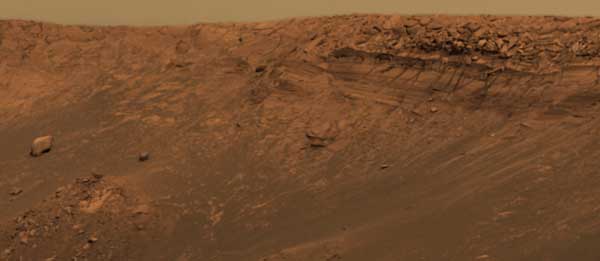

Images Credit: NASA/JPL
|
The images above show a portion of the interior of Endurance Crater. The top one is a true color image while the one under it is in false colors. These exaggerated colors are used to identify the different materials found in the crater.
The cyan blue color indicates basalt, the greens are mixtures of basalt and iron oxide and the reds and yellows indicate dusty deposits containing sulfates.
|

Image Credit: NASA/JPL
|
This image shows features on the Martian surface that some scientists interpret as having been produced by the action of moving water. Only time will tell if they are right.
|
|
Spirit
|

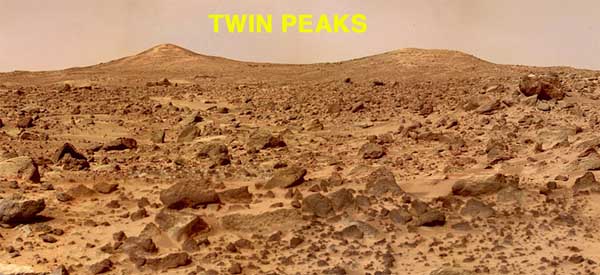
Image Credit: NASA/JPL
|
The images above show the view looking toward the Columbia Hills. Spirit should be there soon. I can't wait to see what lies beyond those hills!
|
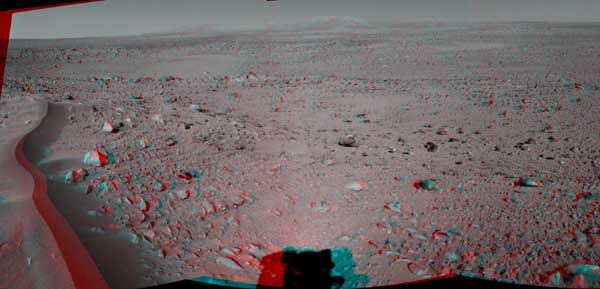
Image Credit: NASA/JPL
|
Here is a 3D image - don't forget to use your red-green glasses while viewing this image - showing Lahontan Crater.
|

Image Credit: NASA/JPL
|
Here is a color image of another geologic feature that Spirit studied while it was traversing toward the Columbia Hills, Bonneville Crater.
|
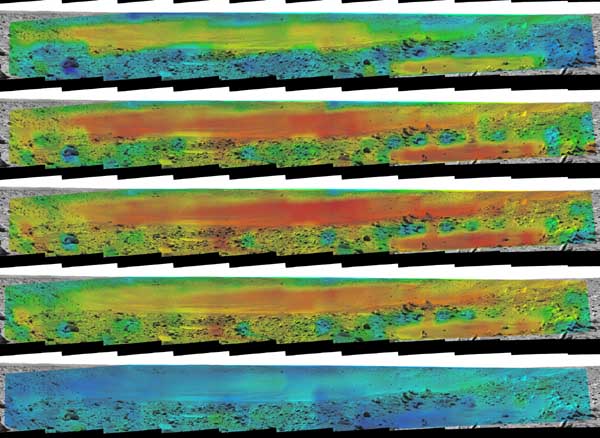
Image Credit: NASA/JPL
|
The above pictures show the temperature of the Bonneville Crater over the course of a Martian Sol. {The different colors correspond to different temperatures.} Studies of how these temperatures change as the solar heating varies are a good way to determine the physical properties of the Martian surface.
You can find more detailed description of what these colors mean by going to this JPL Mars Rover Web Page.
|
Listen to this show
|

|
- Click here to listen to the entire show. {1:52:47}
Or
- Click here for the show's intro music.{0:41}
- Click here for the show's opening. {34:56}
- Click here for our interview with Gene Meyers. {1:15:26}
- Click here for the show's closing.{1:44}
- Click here for links to all of our previous Shows that you can listen to on the Hour 25 Web Site.
|
If you enjoyed this show and would like to know when other interviews are uploaded to the Hour 25 web site, then send an email to me at [email protected] and I will add your name to the free Hour 25 Newsletter mailing list. That way you'll get a brief notice in your email every time a new show gets uploaded to the web.
Links for more information relating to this week's show
Gene Meyers and the Space Island Group
To learn more about the activities of the Space Island Group you should visit their Web Site.
An early discussion about using Shuttle External Tanks in orbit can be found in this paper from the Space Studies Institute.
Information about using External Tanks on-orbit can be found at this Web Page from the Space Frontier Foundation. {They also have a page filled with pictures of various ET based space station concepts that is quite interesting.}
The External Tanks in Orbit Web Page has a wealth of information about this topic and a huge number of links to other pages. While you're there be sure to visit the Orbit 6 Home Page where you will find a lot of other fascinating information.
More pictures and links associated with the use of External Tanks in orbit can be found at External Tank Space Stations.
Software to Stop Spyware
Two good programs for dealing with spyware are Ad-Aware
and SpyBot. Don't go on-line without them. {Unless you want to spend a lot of time trying to eradicate the spyware that will slip past your virus checker.}
The "CoolWebSearch" (CWS) spyware program is particularly irritating. It destroys your home page, slows down your browser, uses memory like a pig and can make your system unusable. Information about how to get rid of this malware can be found at the Merijn.org Web Site. If you think you have been hit by CWS then be sure to download "CWShredder" from their Web Site.
Eradicating spyware can - as I just discovered - require a good bit of manual work. One of the best sources for information about this can be found at a web page put up by Psychicfred.com . {This fellow found that for some reason spyware programs were sending people to his Web Site. In self defense he became a resource to help other people get rid of that spyware. Many thanks, Fred.}
Burt Rutan and the X-Prize
Burt Rutan, and his company Scaled Composites, have been making great progress in their attempt to develop a vehicle that can carry three people on a suborbital journey into space and win the X-Prize. Be sure to check out their Web Site to find the latest results from their flight test program. You can also find information there concerning their upcoming X-Prize flight.
Information about the X-Prize can be found at their Web Site.
Additional information about the prospects for suborbital space travel can be found at the Web Site for the Suborbital Institute.
The Transit of Venus
The Venus Transit 2004 Web Site has information about the how to view this event and will have on-line images of it while it happens along with much related information.
Archived images of the transit of Venus can be found at this Exploratorium Web Site.
In 2007 NASA will launch the Kepler mission, which will look for rocky planets orbiting other stars by watching for them to transit in front of their star. Information about this project can be found at its Web Site.
Space Related Organizations
If you are interested in learning more about current space activities there are many local and national organizations you might want to know about. Joining these organizations and taking part in their activities is a good way to stay abreast of things going on in space as well as a way to show your support for those activities. Listed below are some of those organizations.
The Organization for the Advancement of Space Industrialization and Settlement has long been place for persons living in the Los Angeles area to gather and discuss the promise of space. Be sure to check out their Web Site for information about their meetings and other activities.
The Orange County Space Society is another Los Angeles area organization that provides a focal point for persons who are interested in space developments to get together and share their ideas. They have created a number of displays explaining the history and importance of space exploration that have appeared at various public events. Be sure to check their Web Site for information about their meetings and other events.
The National Space Society has a long history of being an advocate for a vigorous space program and provides much information to its members through their magazine and Web Site.
The Space Frontier Foundation is a strong advocate for a non-governmental space program and serves as a focal point for much activity in that arena. Their annual conference in Los Angeles during the Fall is a great way to find out what is happening in the non-government space arena.
The Space Access Society is focused on reducing the cost of going into space by promoting non-governmental launch vehicle programs. Their annual conference in the spring is a major source of information on non-traditional launch vehicle activities.
The Planetary Society is focused on the exploration and has a wealth of information for its members and others.
Space News - Mars
For more information about the Mars Exploration Rovers be sure to check out the MER Web Site at JPL or this Mars Rover site at Cornell University.
To learn more about the Mars Express mission you can go to this ESA Mars Express Web Site, this Mars Express Web Page from JPL, this NSSDC Mars Express Web Page, or this Web Page from Mars News.Com.
For more information about the Exploration of Mars be sure to go to the JPL Mars Exploration Site, the Center for Mars Exploration at NASA Ames, or the Mars Missions Web Site at the Planetary Society.
Information about the data returned by previous Mars missions can be found at this Mars Web Page at the NSSDC.
Information about the Phoenix Mission to Mars can be found at this Press Release from the University of Arizona. You can view a 3D picture of the Mars Phoenix spacecraft here.
For more Mars news be sure to check out the Mars News.Com Web Site.
Percival Lowell did much to shape our ideas about Mars in the early years of the 20th Century. You can learn more about his work by reading this on-line copy of his 1895 book Mars.
For On-Going Updates on Space News
Links relating to the loss of Space Shuttle Columbia can be found here.
The Reusable Launch & Space Vehicle News Web Site Web Page that is part of the Hobby Space Web Site is a really good place to watch for news about, well... Reusable Launch Vehicles and related subjects. I check it out just about every day and often find news there that doesn't show up anywhere else. Give it a look. {And while you're there be sure to check out some of the site's other pages. Wow! Is there a lot of information there.}
The Space Today Web Site is a great place to find space news from all over the 'net.
The Spaceflight Now Web Site carries real time information about current space missions and presents a lot of space and astronomy news. This is the place I go to when I want up to the minute information about current space missions. Do I need to say more?
The NASA Watch Web Site is another great place for getting information about current space missions. Check there also for news about other 'goings on' within NASA. Highly recommended.
ISS News
The Florida Today Web Site has a very interesting report about the causes of the ISS budget problems and their impact on the space program. It makes very interesting reading.
Click here to view the press kits for various ISS missions.
Check out the NASA International Space Station Web Page or the Boeing Web Page to learn more about this project.
A great source of news about Russian space activities, including their work on the ISS, can be found at the Russian Space Web.
Do you wonder where the Space Station is right now? You can use your browser to view real time maps showing the location of the ISS by going to this link at the NASA Space Link Web Site or here at the Johnson Spacecraft Center. Please note that your browser must support Java to make use of this satellite tracking software.
You can find out when the ISS - or many other spacecraft - can be seen from your location by going to this NASA Web Page. Please note; your browser must support Java for this application to work.
Click here for information about the audio files used for Hour 25 and for information about configuring your browser and downloading audio players.
Please note Web Pages from external sites will open in a separate browser window and that Hour 25 Productions are not responsible for the content of any external Web Sites.
|
Return to the Index for this month's shows
Back to Hour 25 Home Page
Unless otherwise noted the entire content of this web site is
Copyright © Warren W. James, 2000-2004. All rights reserved.
|
|





 Image Credit: NASA/JPL
Image Credit: NASA/JPL
 Images Credit: NASA/JPL
Images Credit: NASA/JPL












 Image Credit: NASA/JPL
Image Credit: NASA/JPL









